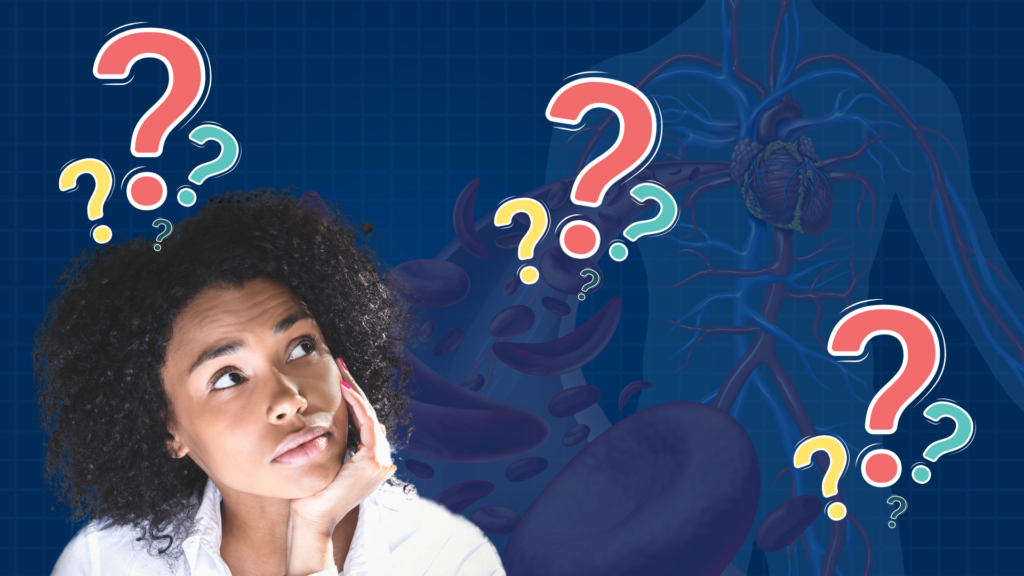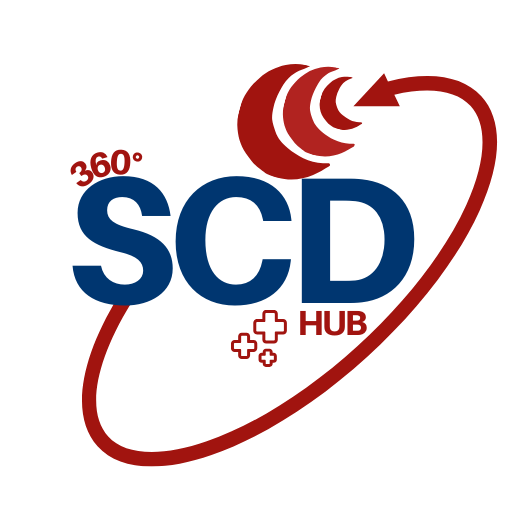Top 20 Questions about SCD

1. What is Sickle Cell Disease (SCD)?
SCD is a genetic blood disorder that affects hemoglobin, causing red blood cells to become rigid and shaped like a sickle. This can block blood flow and lead to pain and other complications.
2. How is SCD inherited?
SCD is inherited in an autosomal recessive pattern. A child must receive two sickle cell genes, one from each parent, to have the disease.
3. What are the symptoms of SCD?
Common symptoms include pain crises, fatigue, anemia, infections, and swelling in the hands and feet. Severity of symptoms can vary greatly among individuals.
4. What triggers a sickle cell crisis?
Triggers can include dehydration, temperature changes, high altitude, stress, and infections.
5. How is SCD diagnosed?
SCD is usually diagnosed with a blood test called a hemoglobin electrophoresis, often performed as part of newborn screening programs.
6. What treatments are available for SCD?
Treatments include medication for pain, hydroxyurea to reduce crises, blood transfusions, and, in some cases, a stem cell transplant. Gene therapy is also an emerging treatment.
7. Can SCD be cured?
Currently, the only potential cure for SCD is a stem cell or bone marrow transplant, but it’s not suitable for everyone. Research into gene therapy is ongoing.
8. How can I manage pain related to SCD at home?
Pain management strategies include staying hydrated, using heat packs, taking prescribed pain medication, and engaging in gentle exercise as tolerated.
9. What complications can arise from SCD?
Complications can include stroke, acute chest syndrome, organ damage, and increased susceptibility to infections.
10. How does SCD affect daily life?
Impact varies widely; some people have frequent pain episodes and hospitalizations, while others may have milder symptoms. With proper management, many people with SCD lead full, active lives.
11. Is it safe to exercise with SCD?
Yes, but it’s important to stay hydrated, avoid extreme temperatures, and listen to your body. Consult with your healthcare provider for personalized advice.
12. Can people with SCD travel?
Yes, with precautions like staying hydrated, avoiding high altitudes, and carrying medication. It’s advisable to discuss travel plans with a healthcare provider.
13. How does SCD affect pregnancy?
SCD can increase the risk for complications during pregnancy for both the mother and baby. Women with SCD should seek care from a healthcare team experienced in managing high-risk pregnancies.
14. What diet is best for someone with SCD?
A balanced diet rich in fruits, vegetables, whole grains, and lean protein is recommended. Staying hydrated is particularly important.
15. How can I prevent infections?
Frequent handwashing, staying up-to-date with vaccinations, and taking prophylactic antibiotics if prescribed can help prevent infections.
16. What is hydroxyurea and how does it help?
Hydroxyurea is a medication that can reduce the frequency of pain crises and acute chest syndrome by making red blood cells less sticky.
17. Can SCD be detected before birth?
Yes, prenatal tests like amniocentesis and chorionic villus sampling (CVS) can diagnose SCD in the fetus.
18. What support resources are available for families affected by SCD?
Many hospitals and organizations offer support groups, counseling, and educational resources for individuals and families.
19. How can I get involved in SCD research or trials?
Discuss with your healthcare provider about current research studies or clinical trials for which you might be eligible.
20. Where can I find more information about SCD?
This 360° SCD Hub app was designed to connect you with tons of information. Other reputable sources include the Sickle Cell Disease Association of America, the National Heart, Lung, and Blood Institute, and the Centers for Disease Control and Prevention. Check out our Resource Sites for more information.
Recommend0 recommendationsPublished in General Public, Living with SCD: General, Living with SCD: Parents





Responses